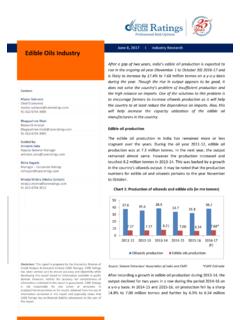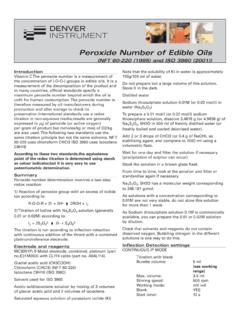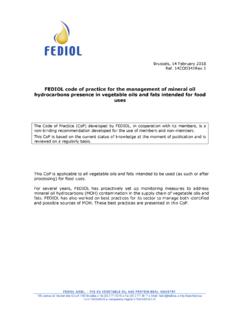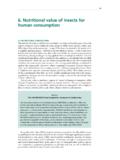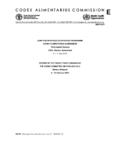Transcription of SCOPA Code of Practice for The Transport of Edible Oils ...
1 SCOPA Code of Practice forThe Transport of Edible oils and Fats in Road Tank CarsA technical standard issued byThe Seed Crushers and Oil Processors AssociationVersion 9 Feb 2016 SCOPA Code of Practice For the Transport of Edible oils and Fats in Road Tank 9 February 2016 Page 2 of 26 Published byThe Seed Crushers and Oil Processors AssociationPO Box 1189 BromleyBR1 9 XWTel:020 8464 Published April 2004 Version 2 published April 2005 Version 3 published July 2007 Version 4 published May 2008 Version 5 published October 2010 Version 6 published July 2012 Version 7 published March 2013 Version 8 published November 2014 Version 9 published February 2016 SCOPA Code of Practice For the Transport of Edible oils and Fats in Road Tank 9 February 2016 Page 3 of 26 INDEXI ndexPage 3 Mission StatementPage 4 Code of PracticePage 5-10 Appendix 1 Haulier RegistrationPage 11 Appendix 2 Haulier Registration FormPage 12-15 Appendix 3 SCOPA List of Foodgrade ProductsPage 16-17 Appendix 4 SCOPA Membership ListPage 18 Appendix 5 List of SCOPA Registered HauliersPage 19 Appendix 6 SCOPA Approved Wash StationsPage 20 Appendix 7 SCOPA Tanker Construction & MaintenancePage 21-24 Appendix
2 8 Ordering SCOPA Log BooksPage 25 Appendix 9 Auditing ProceduresPage 26 SCOPA Code of Practice For the Transport of Edible oils and Fats in Road Tank 9 February 2016 Page 4 of 26 MISSION STATEMENTThe key objective of the SCOPA Code of Practice is to promote the highest possible standards of safety, hygiene, product integrity and quality throughout the Edible oils and fats supply chain. SCOPA also provides a forum for open discussion with all parties involved to work together to protect and promote the safe transportation of Edible oils and fats in road tank cars within the Code of Practice For the Transport of Edible oils and Fats in Road Tank 9 February 2016 Page 5 of 26 SCOPA CODE OF PRACTICEFOR THE ROAD Transport OF Edible oils AND FATS IN ROAD TANK CARS1.
3 INTRODUCTIONIn the interests of health and hygiene, SCOPA members have agreed to implement and regulate this SCOPA Code of Practice as forming part of good manufacturing Practice . This Code enforces the requirements of current applicable UK and EU Food Safety Act 1990, together with other applicable UK and EU food hygiene and safety legislation, sets out responsibilities for all food businesses involved in the production, processing, storage, distribution and sale of food. This legislation sets out the legal framework for enforcement and penalties for infringements. It is required that SCOPA hauliers are conversant with all relevant legislation and ensure that their drivers are aware of their responsibilities under the current legislation it is a requirement that food businesses have a HACCP programme in place. 2. SCOPET ankers shall be dedicated to foodstuffs only.
4 This covers all relevant tanker operations including, without limitation, wash standards, loading, and the transportation and delivery of Edible oils and fats by road within the UK thatfall within the scope of this products covered by this SCOPA Code are all Edible oils and fats, crude and refined, including acid oils and fatty acids, which are destined for human consumption either directly or indirectly or for incorporation in animal HAULIER REGISTRATIONAll hauliers, and each tanker that they operate within the scheme, are required to be registered by SCOPA see Appendix 1. This includes SCOPA registered hauliers wish to hire, rent or lease road tankers for use pursuant tothe SCOPA scheme, they must ensure that they comply with the Code of Practice and that such tankers form part of their list of registered TANKER REGISTRATIONSCOPA Code of Practice For the Transport of Edible oils and Fats in Road Tank 9 February 2016 Page 6 of 26 All tankers registered under the SCOPA Code of Practice must be and have been dedicated to the Transport of food grade products (see Appendix 3) and must meet the criteria set out in Appendix 7.
5 All appropriate documentation must be provided by the haulier. No tankers can have previously carried or will in the future carry anything considered dangerous to human or refurbished tankers and those not previously registered with SCOPA , must go through the following procedures - wash minimum 1 food grade product from Category 2 of Appendix 3 wash inspect if accepted by a SCOPA member, then numbers and their corresponding chassis numbers must be provided to SCOPA upon registration. Hauliers will then be issued with a unique SCOPA registered haulier number which should precede the individual tanker number and be endorsed indelibly and permanently on the back end of the tank dome along with the word SCOPA . Each side of the tank, above the discharge valve and on the rear dome must be permanently and indelibly endorsed with the words Foodstuffs Only or European equivalent.
6 All markings must be minimum 8cm markings must be removed when the haulier or tanker is no longer operating under the SCOPA Code of should ensure that their list of registered tankers is kept up-to-date. They mustcheck and re-confirm their lists with SCOPA every 6 MULTI COMPARTMENT TANKERS Multi-compartment tankers must be registered as such with SCOPA , along with the litre capacity of each compartment. Each compartment must also have its own declaration of product(s) carried in the log books in order that full traceability can be note that even when a compartment is not in use or been empty for some time, this must be recorded in the log book and must correspond to the entries in the hauliers commercial traffic FLEXIBLE HOSE TRACEABILITYAll flexible hoses must be permanently identifiable and traceable. 7. TANKER CONSTRUCTIONT ankers shall be constructed in a manner that ensures the safety and quality of the product carried within it.
7 Please refer to Appendix MAINTENANCEV ehicles and tankers are to be kept clean and in a good state of repair for food use. SCOPA hauliers must be able to demonstrate a full preventative maintenance programme which takes account of food safety, quality and legal requirements. The minimum requirements are those specified by the Vehicle Operator Standards Agency (VOSA). SCOPA Code of Practice For the Transport of Edible oils and Fats in Road Tank 9 February 2016 Page 7 of 269. HEALTH AND SAFETYL ocal site health and safety instructions must be observed at all times. Safe working practices for road tankers are detailed in SCOPA s guidance document entitled Preventing Falls from Road Tankers . In order to comply with refinery hygiene, health and safety rules, drivers must be able to understand and communicate clearly with on-site staff otherwise vehicles may be DRIVER TRAININGR egistered hauliers and their employees must be experienced and knowledgeable in the transportation and handling of Edible oils and fats.
8 They must also adhere to and maintain the necessary documentation requirements and controls to demonstrate due diligence in the care of SCOPA members must include a full understanding of both the SCOPA Code of Practice on Road Tank Cars as well as the SCOPA Code for Preventing Falls from Tankers and training should include any potential risks and requirements to protect food safety. This training should take place before commencement of unsupervised driving on SCOPA loads. Drivers training records must show evidence of such training as well as competency assessments by competent trainers and must be made available to SCOPA or its auditors on request. Drivers must also be trained and be able to operate all vehicle functions and truck variants within the fleet. It is recommended that drivers receive refresher training every 2 years which should take the form of a practical observation as opposed to a tick box checklist.
9 11. LOG BOOKSEach SCOPA registered tanker must have a uniquely numbered log book containing 100 duplicated certificates, used to record details of the tanker, the last 3 loads carried and cleaning details (unless SCOPA members deem cleaning to be unnecessary). These books must be purchased from SCOPA direct in boxes of 10 see Appendix 8. Every vehicle applying for a load must have an up-to-date and complete log book. When a new log book is used for the first time on a SCOPA load, the tanker will be checked and the check-list on the front of the log book will be completed by a SCOPA refiner member. The carriage of two or more active log books for one tanker is strictly prohibited. In order to ensure that completed log books are retained safely by the haulier, the last few certificates of a book can be voided clearly and a new book log books mustbe kept for a minimum of 2 years, from the date of the last entry, by the haulier in order to provide full traceability for the tanker.
10 12. LOG BOOK (LOST, SPOILED OR DAMAGED CERTIFICATES)Log books can exist in an environment whereby moisture, dirt or product can come into direct contact with a log book which can render some entries difficult to read. It is the SCOPA Code of Practice For the Transport of Edible oils and Fats in Road Tank 9 February 2016 Page 8 of 26hauliers responsibility to ensure an accurate record of traceability is maintained should a book/certificate suffer damage to the extent that it cannot be effectively read. Some books/certificates may be repairable but alterations must be initialled and validated. Any spoiled certificates must have a declaration from the haulier attached to them detailing the correct information. If a certificate is cancelled, the original and duplicate must remain in the log book and be clearly endorsed is the haulier s responsibility to ensure that log books are protected as much as is reasonably possible from spoilage.

